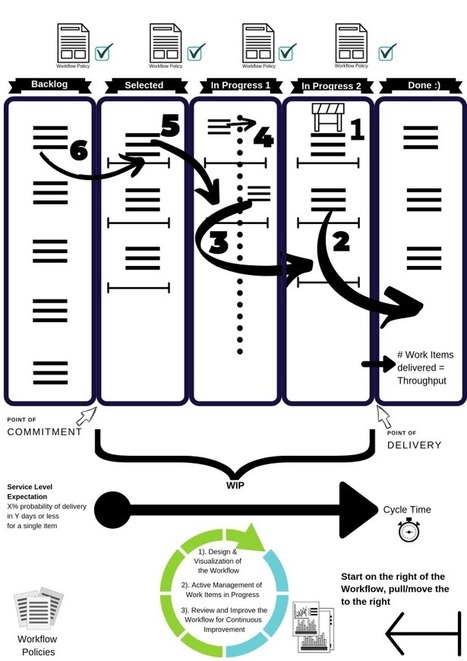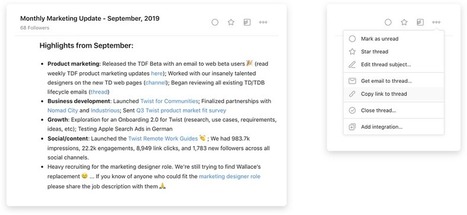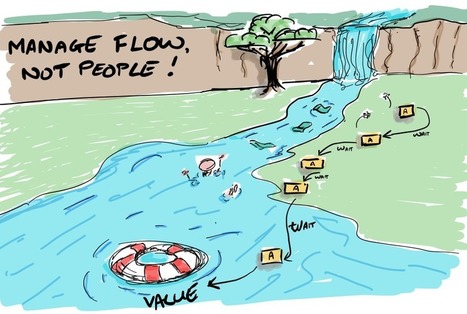 Your new post is loading...
 Your new post is loading...

|
Scooped by
Mickael Ruau
July 15, 2020 1:19 AM
|
Kanban the Flow Strategy™ provides the basic structure for Kanban, which the reader can augment using models such as Evidence Based Management, Cynefin Sense-Making, Theory of Constraints, and scaling/descaling.
We have our quirks, and we consider some things as optional that maybe you thought were mandatory.
Download the Guide for Kanban – the Flow Strategy™ here.

|
Scooped by
Mickael Ruau
June 12, 2020 5:54 AM
|
Amongst the twelve primary practices of XP comes Quarterly Cycle. Quarterly Cycle along with the other practices helps in assuring a real flow for …

|
Scooped by
Mickael Ruau
April 30, 2020 2:44 AM
|
Edmunds.com puts a weekly moratorium on meetings and reserves Thursdays for reflection and creativity.

|
Scooped by
Mickael Ruau
April 20, 2020 12:42 PM
|
More than half the engineers I interview cite “too many meetings” and “not feeling productive” as one of the key drivers as to why they’re looking to leave their current company.

|
Scooped by
Mickael Ruau
March 4, 2020 2:22 AM
|
Il est très fréquent que les équipes de développement soient très souvent interrompues dans leur travail : un chef de projet qui a une idée d’ajout dans le logiciel, une personne de l’équipe commerciale qui a une question, un client qui passe un coup de téléphone direct à un développeur qu’il connait…

|
Rescooped by
Mickael Ruau
from Getting Things Done
February 5, 2020 2:34 AM
|
Why grouping your next actions by contexts is important to work effectively.
Via Emeric Nectoux

|
Scooped by
Mickael Ruau
November 4, 2019 3:04 AM
|
Que votre équipe ait adopté le travail sur site pour profiter de certains avantages comme une forte intégration physique des salariés au groupe, ou que vous ayez opté pour le télétravail pour plus de flexibilité des ressources humaines ou pour éviter les distractions du bureau – nécessaire pour les tâches comme l’écriture de code –, un facteur important de la productivité des équipes serait la forme de communication adoptée.

|
Scooped by
Mickael Ruau
September 13, 2019 1:46 AM
|
ABSTRACTDespite the noted potential for team flow to enhance a team's effectiveness, productivity, performance, and capabilities, studies on the construct in the workplace context are scarce. Mos

|
Scooped by
Mickael Ruau
September 9, 2019 2:54 AM
|
Learn how your teams can achieve team flow, a state of ultimate concentration and innovation, to reach maximum creativity and productivity.

|
Scooped by
Mickael Ruau
September 3, 2019 9:41 AM
|
Dans la série "la Voix du Coach", InfoQ FR échange avec Samuel Retière : "Quand on m'a proposé de parler dans la voix du coach, je me suis demandé ce que j'allais bien pouvoir apporter de plus que les autres coachs passés avant moi. Il paraît que je suis différent des autres car interne (Société Générale) et que je peux donc avoir un regard divergent".

|
Scooped by
Mickael Ruau
May 17, 2019 3:52 AM
|
Today we tackle Chapter 2 of Daniel S. Vacanti’s Actionable Agile Metrics for Predictability. Chapter 2 is titled The Basic Metrics of Flow. The concept of flow is critical to predictability. Buy your copy today and read along!
The basic metrics of flow (noted in Chapter 1) are:
Work in progress
Cycle time
Throughput

|
Scooped by
Mickael Ruau
April 30, 2019 11:11 AM
|
Prof. Mihaly Csikszentmihalyi, author of the global best-seller book Good Business, conducted deep interviews with several leaders of internationally successful, and sustainable organizations. He found that these successfully created Flow-promoting Organizations and implemented the Flow-Leadership style. Together with him, our team at Aleas Sims/FLIGBY has identified a core of 29 management and leadership skills. In cooperation with…

|
Scooped by
Mickael Ruau
April 25, 2019 10:37 AM
|
A New Science is showing us how staying in-the-flow may be the most important part of building extraordinary teams.
|

|
Scooped by
Mickael Ruau
June 25, 2020 2:47 AM
|
Flow is King. Agility is a side-effect.

|
Scooped by
Mickael Ruau
May 4, 2020 2:42 AM
|
Sometimes meetings can get in the way of quality work. This is why trying, "no meeting" days can help boost productivity and attention levels in meetings.

|
Scooped by
Mickael Ruau
April 30, 2020 2:43 AM
|
The number one blocker of productivity in the workplace is distractions, and standing meetings can easily be an unnecessary blocker for your team.

|
Scooped by
Mickael Ruau
March 11, 2020 3:15 AM
|
After having read Dan Vacanti’s book on Actionable Agile Metrics for Predictability I decided to put my learnings into practice and teamed up with a Scrum Master of a team that recently started…

|
Scooped by
Mickael Ruau
March 3, 2020 12:40 AM
|
Talk at LAST Conference 2019

|
Scooped by
Mickael Ruau
November 22, 2019 2:35 AM
|
I spent 4 days in Disentis, Switzerland discussing the latest developments in Agile, Continuous delivery, Kanban and Lean with Leif Sørensen (partner in a medium sized company focusing on continuous delivery called Praqma), Jan Hvid Sørensen (developer working on his own StartUp) and Klaus Bucka-Lassen (Senior Agile Executive Coach).
One of the problems we ended up spending time working on was how to effectively manage the need for long term optimization of the technical platforms and continuous delivery tools and processes against the more short term focus on features and end-user value.

|
Scooped by
Mickael Ruau
September 24, 2019 10:35 AM
|
Swarming is the act of all development team members working on only one requirement at a time during the sprint. Although not a principle specific to scrum, it is such an effective way for teams to execute their sprint backlog that it warrants some more discussion. Again, one of the main benefits of scrum is …

|
Scooped by
Mickael Ruau
September 10, 2019 12:49 AM
|
It’s generally agreed upon that the employees who are the happiest and the most productive have one thing in common: they frequently achieve flow. Flow is when we are so focused and involved in our work, we lose track of time. Sometimes we even forget to take breaks—that’s how “in the zone” we are. Flow is when we’re accessing our best ideas, seeing creative solutions to problems, and getting a lot done. We’re probably also enjoying ourselves!

|
Scooped by
Mickael Ruau
September 6, 2019 4:46 AM
|
Le Team Flow : expérience optimale de coopération La théorie du flow décrit l'état mental de bien-être, promoteur de performance, qu'est susceptible de vivre un individu lorsqu'il est totalement immergé dans la réalisation d'une activité. Alors que les recherches sur ce construit sont nombreuses, les études s'attachant à analyser les formes sociales du flow sont quasi inexistantes. Cette communication vise à revenir sur les recherches que nous avons menées ces dernières années et qui constituent les premières études sur l'état de coopération optimale ou « team flow ». Réalisés dans le contexte des jeux vidéo coopératifs, ces travaux pionniers ont permis de mieux cerner la nature et le fonctionnement de ce concept méconnu aux larges perspectives applicatives (management, projets coopératifs, sports, e-sports…).

|
Scooped by
Mickael Ruau
July 9, 2019 9:06 AM
|
Les slides de la session à Agile Laval 2019

|
Scooped by
Mickael Ruau
May 1, 2019 6:24 AM
|
Calculating your flow efficiency
Measuring flow efficiency can be done for a single request, but its much more likely that you want to measure the flow efficiency of your process over all requests completed in a specific time period. So, for the items completed in that time period, you’ll need the following information.
Overall Lead time (work + wait time)
Active Work time (do not include time spent waiting)
You then calculate the flow efficiency by dividing the active work time by the overall lead time. Multiply the result of that equation by 100% and the result is your flow efficiency for the given time window.
flow efficiency formula

|
Scooped by
Mickael Ruau
April 29, 2019 11:06 AM
|
Flow-based Leadership makes the organization innovative, creative, and profitable. Have you ever worked with a team of people who are all in flow? Great teams are committed and connected. Purpose binds them together. You will do whatever it takes to accomplish your goals.
|
 Your new post is loading...
Your new post is loading...
 Your new post is loading...
Your new post is loading...




























